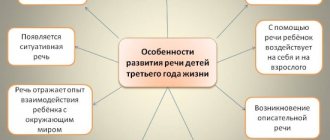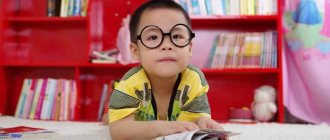Echolalia is the automatic repetition of other people's words, phrases, sentences, and even large parts of texts in speech.
In the process of individual development, there is a stage when echolalia in children is the norm - up to 2 years. At this age, the child actively imitates the behavior of adults (this is a mechanism of healthy mental development). From 6 to 9 months, one can also distinguish a period of normal autoecholalia - this is the time when the child himself repeats babbling syllables (ba-ba-ba, ma-ma-ma). Often parents mistake these autoecholalia for the first words.
If echolalia persists after 2-2.5 years, it is a symptom of a developmental disorder. And there is a stereotype that echolalia is a symptom of autism. This is wrong.
Echolalia can occur with various disorders (and even in adults, by the way):
- ZRR, ZPRR;
- Sensory alalia (dysphasia);
- Mental retardation;
- Schizophrenia;
- Autism spectrum disorder;
- Tourette's syndrome.
Echolalia occurs:
- Immediate
- Deferred.
Often, a child with delayed echolalia can perfectly insert phrases from cartoons and songs into the context of the situation. Good mechanical memory may be a kind of compensatory mechanism.
For me, as a specialist, a diagnosis is always of a secondary nature (especially since I do not make them; sometimes a diagnosis is a tribute to one or another administrative requirements of the system). It is much more important to understand the mechanism of the disorder, find out what and where “broke” and how the brain tries to get around it.
What is echolalia, echophrasia? Definition
Echolalia is characterized by spontaneous, compulsive, meaningless
uncontrolled person automatic repetition of sounds, syllables, words that are heard in the speech of other people. Moreover, even the intonation of the words heard can be preserved. The term echolalia comes from the Greek words “echo,” which means “reflection of sound,” and “lalia,” which means “speech,” or “laleo,” which means “speak.” In ancient Greek mythology, there was a nymph named Echo. She was petrified. All that was left of her was her voice. The voice repeated the endings of words that people uttered in her presence. A synonym is echophrasia .
Self-stimulating behavior
Delayed echolalia is sometimes a self-stimulating behavior whose sole purpose is the pleasure of the speaker. My eldest son always likes to repeat sentences he read in books. I realized that he sees the book in his head, and simply entertains himself by “rereading” his favorite passages over and over again. The line "George, what's that smell?" clearly borrowed from the book about the skunk "Curious George", which invariably causes homeric laughter.
He also enjoys repeating clips from his favorite videos as if he were watching them in his head. When delayed echolalia is used as personal entertainment, it can interfere with real communication. An adult can use such echolalia as a hint to gently switch the child to a more constructive activity.
When does echolalia occur?
In what pathological conditions, diseases, illnesses does echolalia occur? Echolalia can more often be observed in various neurological and mental diseases, such as Tourette's syndrome (Gilles de la Tourette's disease), autism (early childhood autism, autistic behavior, autism spectrum, autistic character traits), Andreas Rett syndrome, schizophrenia (catatonic), mental retardation (dementia, mental retardation, imbecility, debility), dysphasia, damage to the frontal lobes of the brain. Normally, echolalia occurs as a stage of speech development in children aged 6 months to 3 years, when the child repeats the words he hears, thus learning speech. If a child at 3 years of age and later repeats or shouts words, then this is a sign of a serious pathology. In this case, you should immediately consult a doctor.
Diagnostics
Long-term persistence of vocabulary and syllabic speech imitation in childhood or the appearance of this symptom in adults requires contacting a psychiatrist and neurologist. Echolalia is diagnosed during communication with the patient and observation of his speech. Typically, identifying automated repetitions of sentences and words is not difficult. To establish the nature of echolalic symptoms, a comprehensive examination is performed:
- Assessment of psychoneurological status.
Anamnesis collection, a clinical conversation, and a neurological examination allow doctors to assess the patient’s general condition: his ability to establish and maintain contact, navigate in space and time, and think critically about his illness. Neurological disorders and psychopathological symptoms accompanying echolalia are detected. - Speech therapy testing.
The speech therapist examines the speech function, determines the degree of its formation, the presence of pronunciation defects, and the loss of individual links. In conclusion, he notes whether echolalia is the result of speech underdevelopment or speech decay. - Pathopsychological testing.
A study of memory, thinking, attention and intelligence is carried out. The results indicate the presence or absence of signs of organic damage to the central nervous system, intellectual underdevelopment as the cause of echolalic manifestations. - Neuropsychological testing.
Diagnostics by a neuropsychologist is aimed at analyzing higher mental functions. Testing data allows us to determine neuropsychological symptoms (various types of alalia, aphasia) and differentiate neurological diseases.
Types of echolalia: immediate, delayed, true, mitigated
Reflexotherapists, neurologists, and psychiatrists distinguish 2 types of echolalia : immediate echolalia, delayed echolalia (delayed). In immediate echolalia, the child immediately repeats a word after hearing it from a person or any other sound source. With delayed echolalia, children repeat previously heard words after a long period of time. Several minutes or several years may pass after hearing the phrase. Delayed echolalia is common in Tourette syndrome and autism and is a feature of the disorder. True echolalia and mitigated echolalia are also distinguished. With true echolalia, automatic repetition of addressed speech occurs; with mitigated echolalia, the patient repeats words with transformation.
Potential risk of hysteria
It's a fairly common scenario in the autism community where the cause of a tantrum is a misunderstanding due to immediate echolalia. An adult asks a child: “Do you want grapes or apples?” The answer is almost always the last word: “Apples.” The adult decides that the child really wants apples. The child then begins to scream wildly when he is given an apple, because the child answered before he even realized the two options offered, and in fact he wanted grapes. Picture cards or PECS are a great way to offer your child options or prepare them for change, which can help prevent tantrums.
Causes of echolalia
When and why does echolalia occur? Echolalia in autism can fill a pause, express agreement or disagreement, name surrounding phenomena, people, objects, allows the child to calm down, train, understand someone else's speech, remember the past, share their feelings, have fun, share experiences and feelings. There are various causes of echolalia.
Child's self-stimulating behavior, stimming.
In this version, the child often repeats words read in books or heard on TV. In this case, the boy or girl has associations and emotions about the actions or objects they saw. Moreover, the appearance of images is not related to the current situation. This greatly interferes with the child's ability to communicate with other children or adults.
Communication of mood.
The child can express his mood, and this mood is often associated with a certain phrase that he remembered the day before. Moreover, the phrase may not be related in meaning to the mood that it expresses in the child.
Systematization of the day's results.
In young children, delayed echolalia may express idiosyncratic processing of information they have received throughout the day that keeps them from calming down.
Unfortunately, in older age, echolalia in most cases indicates a serious pathology, Tourette syndrome , autism, which must be treated in a timely manner.
Why does a child repeat words and phrases?
The idea that echolalia is just meaningless repetition is completely wrong. In different cases, it performs functions necessary for the child:
- Conversation support. The child has already achieved an understanding that communication involves dialogue, but still does not know how (due to age or due to the presence of deviations) to construct a phrase. Here it seems appropriate to repeat the interlocutor’s statement.
- Trying to understand. In this case, the process is similar to adults learning a foreign language - in order to fully understand what was said, sometimes you have to repeat it.
- Designation of objects and phenomena. It's like a child repeating words when he's just learning to say them. The phrase “Sit down at the table!” may refer to the concept of the next meal.
- Expression of consent. Psychologists have noticed that children learn to say “no” much earlier than “yes.” In some cases, repeating a phrase spoken by an adult may mean that the child agrees with you.
- Restoring mental balance. This function is typical for autistic people who love rituals and a familiar way of life. Repeating a familiar phrase helps them calm down.
- Transfer of emotional state. Sometimes it is difficult for a child to express his emotions in words. Ready-made clichés, memorable phrases associated in his memory with certain feelings help him convey his experiences to adults.
- Stimming or self-stimulation. Usually characteristic of children with autistic syndrome. By repeating memorized phrases, the child evokes a certain mental sensation - he calms down or, conversely, gets excited.
A little later, the child will need to work on the development of memory and attention, as well as speech.
Treatment of echolalia in children and adults in Saratov
Sarklinik (Russia, Saratov) successfully uses hardware and non-hardware methods for treating echolalia in children, adolescents and adults in Saratov. Treatment is carried out on an outpatient basis in courses. The minimum duration of one course of treatment is 10 working days. The total number of courses depends on the severity of the pathology. Sarklinik knows how to treat echolalia in boys and girls, how to get rid of echolalia in boys and girls, what to do with echolalia in men and women.
Sarklinik also provides treatment for delayed speech development, treatment for delayed psycho-speech development, general speech underdevelopment (GSD), treatment for mental retardation, mental retardation, treatment of alalia, dyslalia, and autism in children.
Sign up for consultation There are contraindications. Specialist consultation is required.
When using article materials, an active link to sarclinic.ru is required. Text: ® SARCLINIC | Sarclinic.com \ Sarсlinic.ru Photo: © davetroesh / Photobank Photogenica / photogenica.ru The people depicted in the photo are models, do not suffer from the diseases described and/or all coincidences are excluded.
Related posts:
Vegetative vascular dystonia in children, treatment of VSD in Saratov
Cerebrasthenic syndrome: treatment, symptoms in children, adults
Dyslexia, treatment of dyslexia, correction, overcoming, elimination, alexia, treatment of alexia
Enuresis, treatment of enuresis, how to treat nocturnal enuresis in Saratov, Russia
Stuttering in children, stuttering treatment in Saratov, Russia
Comments ()
Correction for echolalia
- Correction, of course, must be tailored individually depending on the mechanism of the violation.
- Tomatis is indicated for slow processing of auditory information (this disorder can often be seen using evoked potential testing);
- You can use visual and kinesthetic supports (pictures, objects) to help your child;
- If there is a violation of thinking, correlation of words and objects, planning a statement, games with checklists, solving “problem” situations (which provoke a departure from the comfort zone and activation of initiative, but feasible for the child), visual-rhythmic tasks, as well as special aids for development of thinking (for example, Strebeleva’s manual).
Neuropsychologist Alexandrova O.A.
To make an appointment with a neuropsychologist, call or fill out the form on the website.
What activities does a child with ASD and sensory alalia need?
It is important to remember that independent work of a parent with a child is not a substitute for specialized speech therapy correction. If the specific manifestations described above occur, you must contact a neurologist and speech therapist. The neurologist will conduct the necessary set of diagnostic studies, and the speech therapist will determine the nature of the speech disorder and draw up a corrective route.
On average, the duration of speech therapy work with children with sensory alalia varies between 1-2 years. Corrective assistance for a child with autism spectrum disorder continues throughout schooling.
What determines the duration of correction of a speech disorder? Firstly, on the severity of speech pathology, secondly, on the systematics of attending correctional classes and, thirdly, on the availability of comprehensive assistance from correctional specialists. Comprehensive care, as a rule, includes sessions with a speech therapist, sessions with a speech pathologist, sessions with a psychologist and long-term observation by a neurologist tracking the dynamics of elimination of speech disorders.
It is you who can become your child’s guide to a completely new world - a world of instructions that he understands, mother’s kind words and father’s kind praise.








